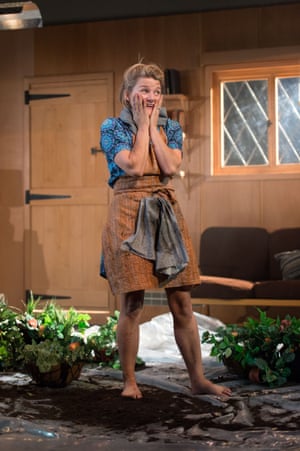“I find it hard to switch off,” admits Stacey Gregg. “The great thing about writing is that you are free to write about anything, to grapple with what’s happening in the world.” For the Belfast-born playwright, that might be issues of science, law, ethics and much more. Her monologue Scorch, inspired by real-life cases of “gender fraud”, is out on tour. The 2013 play Override, in which she explored an alternative near future, has just been given a sharp new production at the Tiger Dublin fringe festival. And Gregg is one of seven playwrights responding to issues around conception and birth in an upcoming international festival at the Royal Exchange in Manchester.
At 33, Gregg has already written six plays, and is under commission from the Royal Court, Clean Break and the Abbey theatre. Our Skype conversation is interrupted by bursts of laughter as she talks at speed, emanating the restless energy that has enabled her to alternate between writing plays, film and TV scripts, with acting stints in between.
Scorch, which won a Fringe First award at the Edinburgh festival last month, was written in response to recent court cases in the UK. “These were cases taken by women who had been deceived into thinking they were having a sexual relationship with a man, but discovered that their partner was a woman or, in one case, a trans man. The accusations were of ‘gender fraud’, which for me is a contested term. I thought that the media coverage sensationalised these cases, and this drove me to try to communicate the questions they raised in a more complex way.”

Initially envisaging it as a TV script, Gregg reworked Scorch as a stage play, which she performed herself, before handing it over to the Northern Irish company Prime Cut. Directed by Emma Jordan, it was produced as part of the Outburst Queer Arts festival in Belfast last autumn. Poignantly performed by Amy McAllister, the solo piece captures the confusion of a teenage girl called Kes who wants to be a boy, and begins an online relationship with a young woman who assumes that Kes is male. The virtual world seems perfect to Kes, allowing her the freedom to present herself as she wants to be.
“It’s about the limitations of language, and of access to language. Kes doesn’t have words for her feelings,” she says. “I’m interested in responses to the play, its interpretation as a trans piece, because that seems to ignore aspects of lesbian sexuality. It is as if butch lesbians have gone away – they haven’t – and now we can only talk about this in terms of a medicalised idea of transition from one gender to another.”
Override examines what happens to relationships when people use technology to enhance or augment their bodies. It fizzes with ideas about biohacking, prosthetic envy and robotics. Its central questions are philosophical, to do with human perfectibility and utopianism. “All of that, and how to be authentic,” Gregg says, “and the continuum we are on when we introduce wearable technology. And our online and offline selves – the difference between me, born analogue, and those 10 years younger than me, digital natives. I’m a bit obsessed with all this.”

Medical interventions into conception and birth and questions about access to reproductive technology are among the themes of a season of performances and debates at Manchester’s Royal Exchange next month. Gregg is one of seven female playwrights from around the world who have been commissioned to respond to the theme in the Birth festival. The plays will subsequently tour. Her solo piece, Choice, interweaves two stories – one of a British woman who is trying to conceive by IVF and one of an Irish woman travelling to England for an abortion. The piece will be performed by Gregg herself. “It’s difficult to describe the form it’s taking, but it is developed from workshops and research, and will be lo-fi. What’s emerging from all of the writers is the global inequality relating to women’s experience of birth.”
Gregg is the representative writer from the UK in this international programme. Moving between Dublin, Belfast and London, she enjoys what she calls her dual citizenship. “Dublin has been good to me. Rough Magic Theatre Company’s Seeds programme was the start, and then the Abbey theatre gave me my first break, for which I’m really grateful.” Her first full-length play, Perve – a prescient work tackling the sexualisation of children and the pervasiveness of pornography – was produced by the Abbey in 2011, followed last year by Shibboleth, which took a chaotically satirical view of Belfast’s peace walls.
Having grown up in Belfast in the aftermath of the Troubles, Gregg left the city to study English at Cambridge, where she narrowly avoided being sent down and was acutely aware of her working-class roots. This was followed by an MA in documentary film-making in London. She is increasingly drawn to writing about Northern Ireland, with a number of her plays set there – Ismene, Huzzies, Shibboleth – as well as two feature films in the pipeline. Her impulse is not only towards her native place, but also to her family background, captured in the class tensions of Huzzies, her comic play for Tinderbox Theatre in 2012 about a no-hoper Belfast rock band.
Currently developing a new play with the performance artist Deborah Pearson for Clean Break, the theatre company that works with women in the criminal justice system, she says: “I want to write about the working poor and women in prison in a way that is not voyeuristic, but empowering.” Breaking new ground, experimenting with dramatic forms, Gregg is racing ahead, her antennae leading her towards performance art. “I’m more and more interested in live art, visual art – people like Kathy Acker or the Gob Squad, artists who combine philosophy and a kind of punk aesthetic, these attract me. I’m learning all the time – it’s hard, and it might involve failure. But I’d much rather see a mess than something that is well finished but has nothing to say, no ideas.”
Stacey Gregg: restless writer whose scripts fizz with tricky questions
Hiç yorum yok:
Yorum Gönder